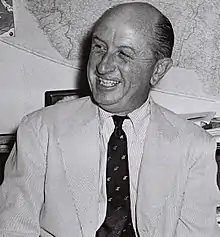Gene Black | |
|---|---|
 | |
| 3rd President of the World Bank Group | |
| In office July 1, 1949 – January 1, 1963 | |
| Preceded by | John McCloy |
| Succeeded by | George Woods |
| Personal details | |
| Born | Eugene Robert Black May 1, 1898 Atlanta, Georgia, U.S. |
| Died | February 20, 1992 (aged 93) Southampton, New York, U.S. |
| Parent |
|
| Education | University of Georgia (BA) |
Eugene Robert Black Sr. (May 1, 1898 – February 20, 1992) was an American banker who was president of the World Bank Group from 1949 to 1962.
He was the eldest son of Eugene Robert Black I, who served as the sixth chairman of the Federal Reserve from 1933 to 1934, during the height of the Great Depression. However, his father did not use the "Sr." suffix; Gene's son (the third in line) became Eugene Robert Black Jr.
Life and career

Black was born in Atlanta, Georgia, in 1898. He attended the University of Georgia, where he was a member of the Chi Phi Fraternity and the Phi Kappa Literary Society. Upon graduating with an A.B. in 1917, he enlisted in the United States Navy. During World War I, he was assigned to convoy duty in the North Atlantic.[1]
Upon leaving the Navy after the War, he joined the investment firm of Harris, Forbes, & Co. He worked as a traveling salesperson for the firm, selling bonds and meeting with bankers and investors. He opened the firm's first southern office in Atlanta and later became a partner in the firm.[1]
In 1933, he was hired by Chase National Bank to be their vice president. He went on to become the senior vice president of Chase National's investment portfolio.[1]
He became the executive director of the World Bank in 1947. When the Bank's President, John J. McCloy, resigned in 1949, Black, against his will, became the President of the Bank.[1]
While not joining in the anti-communist fervor following World War II, Black was concerned about the spread of communism and its impact on the spread of global capitalism. He believed that economic prosperity was an essential prerequisite for political freedom. Black had wanted to return to work for Chase National, but his personal commitment to the objectives of the World Bank overrode that desire, and he remained as President of the Bank.[1]
At the time of his departure from the World Bank, he had been President for 13 of its 16 years of existence, and the force of his personality and connection with every employee led to it being known as "Black's Bank".[1]
In 1963, the United States was considering pursuing a program to create a supersonic transport (SST) to rival the British and French Concorde. President Kennedy commissioned an outside review of the feasibility of a federally funded SST program. Black and Stanley Osborne, chairman of Olin Mathieson Chemical Corporation, led the commission. The review was completed in December 1963 and given to President Lyndon B. Johnson. The report recommended not pursuing a race against the Concorde and instead focusing the effort initially on building a test aircraft for research.[2]
From 1962 to 1968, Black was chairman of the Brookings Institution.[3]
President Johnson selected Black in 1966 to be Special Adviser to the President on Southeast Asian Social and Economic Development. In this position, Black was charged with organizing and establishing the Asian Development Bank. This was a task that Black was initially quite hesitant to undertake, but Johnson would not take no for an answer. To President Johnson, the creation of the ADB was an important step in securing Asian support or at least acquiescence for the War in Vietnam.[4]
Black also served on a number of boards for corporations and foundations. The University of Georgia Foundation named a fellowship in honor of him and his achievements.[5] Princeton University awarded him an honorary Doctor of Laws degree in 1960.[6] Black was Chair of the Peabody Awards Board of Jurors from 1967 to 1977.[7]
References
- 1 2 3 4 5 6 "Eugene Robert Black". Archives. The World Bank. Retrieved August 23, 2006.
- ↑ "Chapter 7 – Aerospace Recession". The Space Shuttle Decision. NASA History Division. Retrieved August 23, 2006.
- ↑ "Principal Officers, 1916–1985". The Brookings Institution. Archived from the original on August 14, 2006. Retrieved August 23, 2006.
- ↑ "Remarks to the Press Following a Meeting With Eugene R. Black Relating to the Asian Development Bank". The American Presidency Project. Retrieved August 23, 2006.
- ↑ "Our benefactors". Archived from the original on June 1, 2004. Retrieved November 13, 2011.
- ↑ "Honorary degrees Awarded by Princeton University". Princeton University. Retrieved August 23, 2006.
- ↑ "The Peabody Awards – George Foster Peabody Awards Board Members". Archived from the original on November 1, 2019. Retrieved May 13, 2015.
External links
- A film clip "Longines Chronoscope with Eugene Black (April 21, 1952)" is available for viewing at the Internet Archive